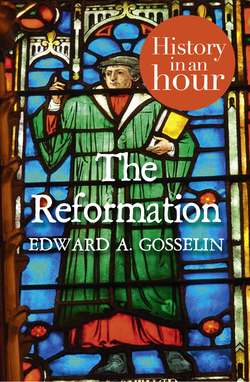Читать книгу The Reformation: History in an Hour - Edward Gosselin A - Страница 10
Оглавление‘Shortening a Stay in Purgatory’
The Church created the indulgence as a hedge against too long a stay in Purgatory (pictured below). Indulgences, of which there were many forms, basically shortened the time of punishment in Purgatory for one’s sins. Prominent among these forms was the purchase of pardon. These purchases were recognized as abusive by the Church itself, but the abuse continued nonetheless. Christians could, depending on how much money they paid for these indulgences, shorten their own souls’ or the souls of their relatives’ duration in Purgatory and hasten entry into Heaven by a year, ten years, several hundred or however much they could afford. However, if the uncertain Christian had not paid enough, the poor soul still might have another several million years to spend in Purgatory; or, conversely, he may have overpaid. Proceeds from the purchase of indulgences were used for rebuilding the ancient St Peter’s in Rome to be the present basilica we know it as today. It was a win-win solution for the Church and an uncertain one for the buyer of the indulgences.
A sixteenth-century depiction of purgatory
Accounting and banking had been developing since the thirteenth century in the city-states of Florence and Venice. By the sixteenth century, several high officials and popes in the Roman Catholic Church came from banking families such as the Medici. The ideas of accounting and the monetary compensation for intercession in Purgatory transferred from traditions of commerce and banking in civil society to the Church and its mission of salvation, with the Church acting as the broker for salvation.
